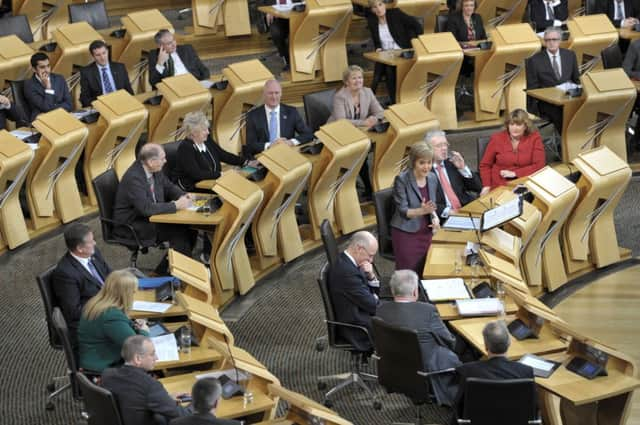Scots face tax rises to fund SNP’s plans - Labour


Income tax would have to be increased by more than 50 per cent to bridge the gap – the equivalent of £2,400 extra per household.
Alternatively £6bn worth of cuts would have to be found, according to calculations made ahead of the publication of Scotland’s annual balance sheet.
Advertisement
Hide AdAdvertisement
Hide AdThe Scottish Government will today publish the Government Expenditure and Revenue Scotland (Gers) figures for 2013-14, which are expected to show a decline in North Sea oil revenue.
In advance of the figures, Labour has carried out its own analysis of the financial repercussions of the SNP’s drive for full fiscal autonomy, a constitutional settlement that would see Holyrood responsible for all spending and collecting of taxes.
Labour argues that full fiscal autonomy would see the end of the Barnett Formula, the funding mechanism that determines how much cash Scotland receives from the Treasury and results in spending north of the Border standing at £1,374 more per head than the UK average.
Labour contrasts full fiscal autonomy with its devolution package of a “Vow plus” that builds on the more powers set out by the Smith Commission but retains the Barnett Formula.
Labour expects the Gers figures to confirm a £8bn fiscal gap between Scotland and the rest of the UK.
Minus the support of the Barnett Formula in a full fiscal autonomy settlement that gap would have to be met by North Sea oil revenues.
Labour predicts that the oil revenues in the Gers figures for 2013-14 will come to just £4.2bn, leaving a black hole of £3.8bn.
The party also forecasts that oil figures will be far worse in 2014-15 as a result of the dramatic slump in the oil price.
Advertisement
Hide AdAdvertisement
Hide AdLabour’s finance spokeswoman Jackie Baillie said: “We believe the Gers figures will show a deficit of approximately £4bn, but the figures for 2014-15 will show, we believe, a deficit of over £6bn.
“This is about two competing visions of devolution – not about re-running the referendum campaign. It is about the offer at the general election. From a Labour perspective, we believe in major new powers for the parliament coming through the Smith Commission coupled with the security of Barnett, because that gives us stable spending on things like schools, the NHS and retains pensions as a UK-wide system.
“The SNP have repeatedly said they want full fiscal autonomy whilst remaining in the UK. That is where Scotland raises all its taxes for all its spending. What they wouldn’t admit is that would result to massive cuts to services.
Six billion is a gaping hole so it either requires cuts to services – £6bn is half of the NHS spend in Scotland. Or it requires an increase in taxation and the estimate is that would be approximately £2,400 extra per household in Scotland and that is simply to stand still.
“If you thought that the Tories austerity plans were bad enough, this effectively is austerity max. It is building on the Tories’ cuts and adding to the plan.”
A spokesman for finance secretary John Swinney said: “Labour’s figures represent the status quo where the North Sea regime is set by Westminster, where successive governments – including Labour ones – failed to invest the benefits of our natural resources for the future and where Scotland does not retain the increase in revenues that comes from our growing economy.”
SEE ALSO
FOLLOW US
SCOTSMAN TABLET AND MOBILE APPS